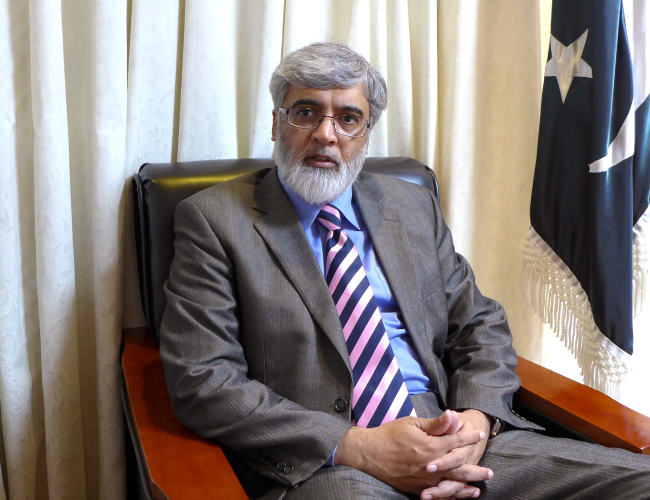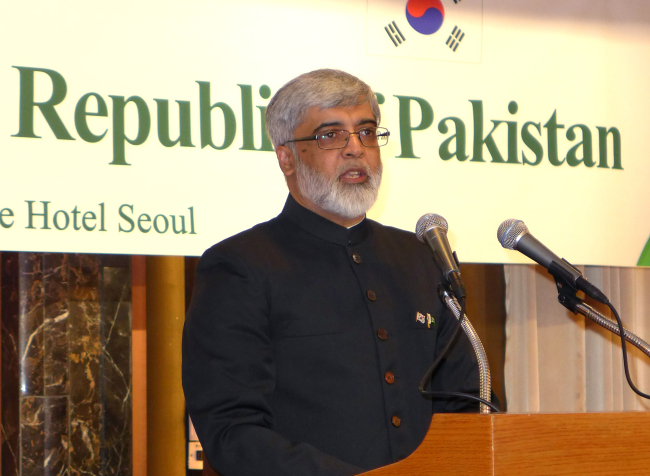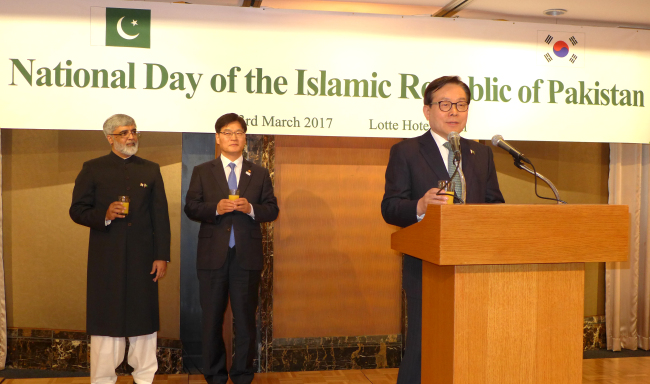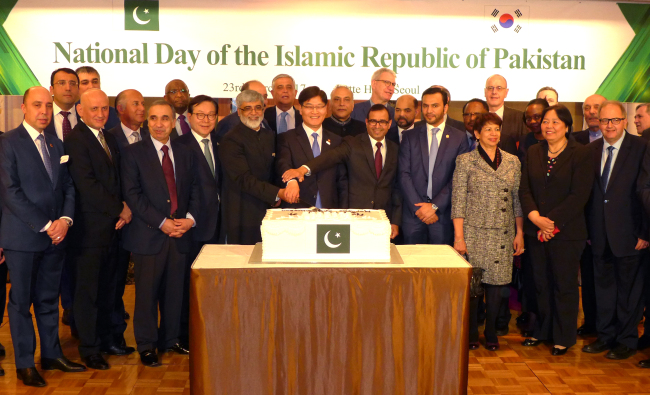“Korean companies now feel very confident in making long-term investments in Pakistan.”
When Pakistani Ambassador Zahid Nasrullah Khan came to Korea in November 2013, he had little idea about the country he would be operating in for the next 3 1/2 years. Now nearing the end of his tenure, the envoy says he has developed an “intimate feel” of the Korean people and culture, which helped achieve concrete results in diplomacy and business.
“Korea was my first diplomatic post in Northeast Asia, and I quickly found out upon arriving that our relations were not moving with a strong momentum,” he told The Korea Herald last week ahead of the Pakistani National Day reception in Seoul on Thursday.
“It was hard creating the momentum, but after three years, I am happy that we have enhanced cooperation in various areas and are working to upgrade the relationship to a strategic level.” 
A career diplomat for 30 years, Khan had been posted to Berne, Switzerland, Jeddah, Saudi Arabia, London and Doha, Quatar before Seoul. He will be Pakistan’s top envoy to Afghanistan after Korea, a weighty post considering the myriad of complicated issues between the two countries.
Under Khan’s ambassadorship, the Korea Eximbank has increased its Economic Development Cooperation Fund from $180 million to $500 million for collaboration in various sectors through 2018. A tangible fruit under the fund is a project building an information technology park in Islamabad, an $88 million venture modeled after Pangyo Techno Valley in Seongnam, Gyeonggi Province.
“In my discussions with the Eximbank executives and Korean diplomats, I told them they are doing a lot of projects building hospitals, roads and tunnels, but none of them stands out as a landmark that Pakistanis can always look to and identify with Korea,” the envoy said. “This park, which will act as the hub of all information technology activities in Pakistan, is something that all Pakistanis will identify with Korea.”
Construction will be finished by 2018 if all goes to schedule, and the facility will be a hotbed of innovation for Pakistan’s technologically savvy entrepreneurs and young people, the ambassador noted.  Khan also assisted Korean companies’ investments in constructing hydroelectric power plants in Pakistan. Four major projects at Gulpur, Asrit-Kedam, Patrind and Athmuqam — worth over $2 billion and generating 875 megawatts of power — are either in the works or should materialize in the near future.
Khan also assisted Korean companies’ investments in constructing hydroelectric power plants in Pakistan. Four major projects at Gulpur, Asrit-Kedam, Patrind and Athmuqam — worth over $2 billion and generating 875 megawatts of power — are either in the works or should materialize in the near future.
“These projects show that Korean companies now feel very confident in making long-term investments in Pakistan,” he said.
Islamabad and Seoul established diplomatic relations in 1983. The two countries will launch the first round of negotiations this year for a prospective bilateral free trade agreement. As the two economies are complementary — with Pakistan largely focusing on manufacturing of textiles, yarn, metals, agri-food and meat, and Korea producing value-added goods — prospects for an early conclusion of talks are high, according to Khan.
There are 11,000 Pakistanis living in Korea, the country’s third-largest diaspora in East and Southeast Asia, following Malaysia and Thailand. They are involved in business and exchanges through the employment permit system and university programs. Some 2,800 Pakistanis are married to Koreans.
At the reception Thursday, Korea’s Environment Minister Cho Kyeung-kyu noted that Pakistan has become the sixth most populous country in the world with the seventh-largest pool of engineers and scientists, having produced two Nobel laureates.  Relations between Pakistan and Korea stretch back more than 1,500 years through early mercantile exchanges between the Gandhara civilization and Baekje dynasty. Bilateral cultural ties are bolstered by diasporas in both countries and the popularity of Korean TV dramas airing on Pakistani television, particularly the “Jewel in the Palace,” he said.
Relations between Pakistan and Korea stretch back more than 1,500 years through early mercantile exchanges between the Gandhara civilization and Baekje dynasty. Bilateral cultural ties are bolstered by diasporas in both countries and the popularity of Korean TV dramas airing on Pakistani television, particularly the “Jewel in the Palace,” he said.
Regarding his next mission in Afghanistan, Khan said a bilateral relation is “not just about political or economic issues, but very much a human-centered one.”
“We share a very long history together,” the diplomat said, adding the two peoples’ ethnic, cultural and human bonds are “so strong that they cannot be cut off.” Khan mentioned the Pashtun speakers in southern and southeastern Afghanistan and northwestern Pakistan.
Afghanistan, which has become increasingly mired in security threats from Taliban terrorists, faces many challenges in nation-building, but its stability and prosperity are vital to Pakistan, he added. 
“My first challenge in Afghanistan would be to make sure our countries are on friendly terms and trust each other,” Khan said. “Secondly, I would need to work on ensuring better modalities for managing our borders, which cannot be sealed indefinitely. Thirdly, I will work on the respectful return of 2 million Afghan refugees in Pakistan to their homeland.”
By Joel Lee (joel@heraldcorp.com)

No Comment